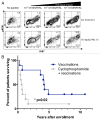Alkylating chemotherapy may exert a uniquely deleterious effect upon neo-antigen-targeting anticancer vaccination
- PMID: 24251080
- PMCID: PMC3827073
- DOI: 10.4161/onci.26294
Alkylating chemotherapy may exert a uniquely deleterious effect upon neo-antigen-targeting anticancer vaccination
Abstract
Alkylating chemotherapy exerts both antineoplastic and immunostimulatory effects. However, in addition to depleting regulatory T cells (Treg), alkylating agents also mediate a long lasting antiproliferative effect on responder lymphocytes. Our recent findings indicate that this antiproliferative effect profoundly impairs vaccination-induced immune responses, especially in the case of vaccines that target specific tumor-associated neo-antigens that do not require Treg depletion.
Keywords: alkylating chemotherapy; cancer vaccines; chemoimmunotherapy; neo-antigens; regulatory T cells.
Figures


References
Grants and funding
LinkOut - more resources
Full Text Sources
Other Literature Sources
